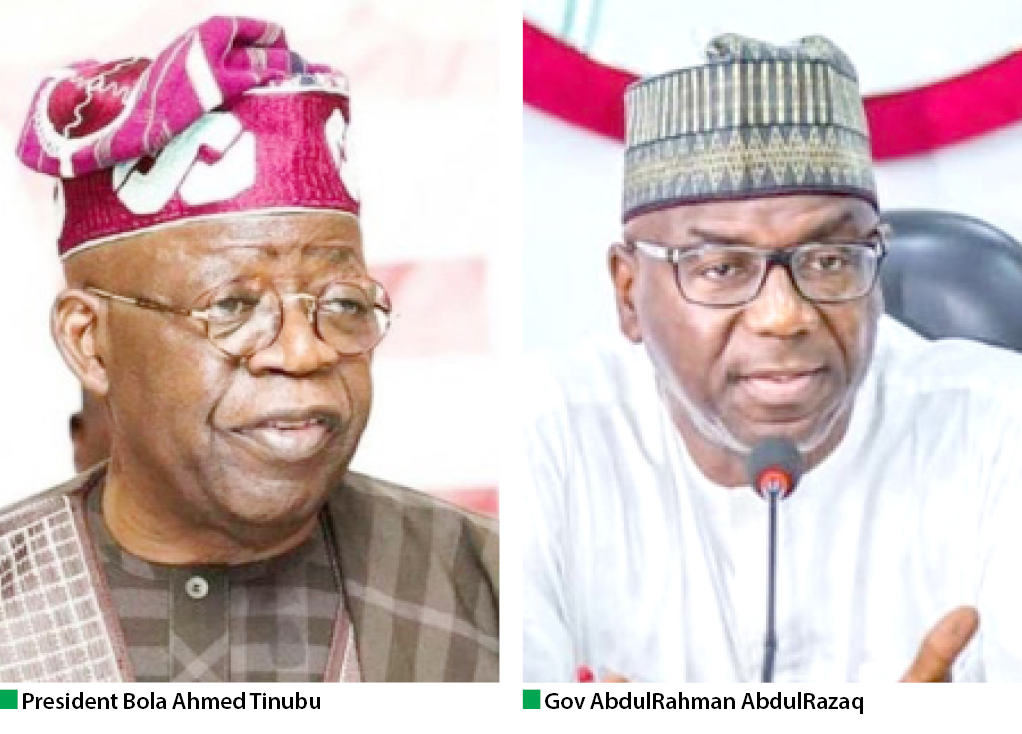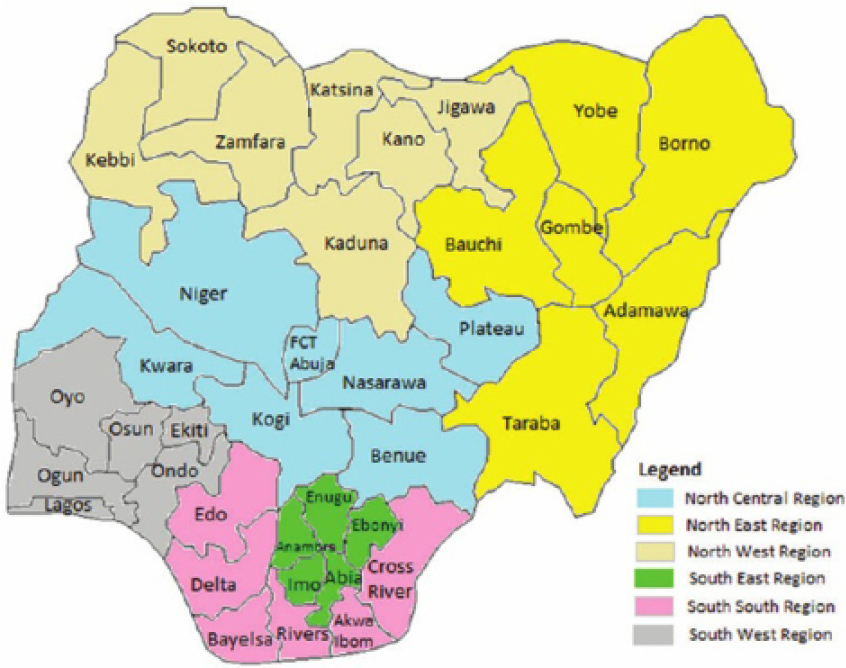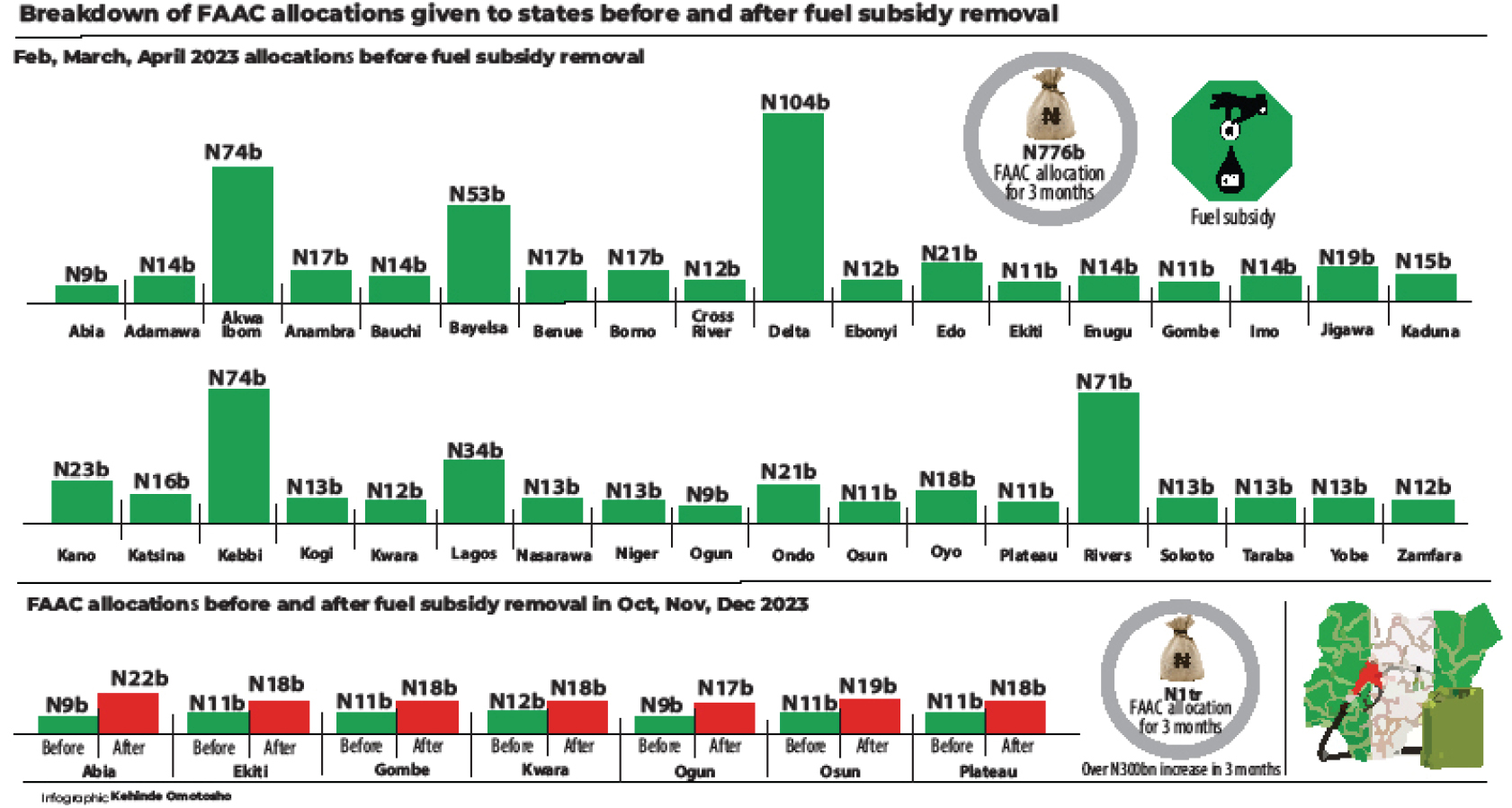Despite having more money at their disposal after the removal of fuel subsidy, there are mixed feelings over alleged failure of some states to deploy the increased revenue into tackling hardship in their states through life-changing projects, Daily Trust on Sunday reports.
Amidst the cost-of-living crisis, the Federation Account Allocation Committee (FAAC) is making more money available to states from the proceeds of the removal of subsidy.
Analysis of the allocation before and after subsidy for three months showed that incomes accruing to states have increased significantly, almost doubling what was accruable to them in the three months before the subsidy removal.
While some states have carried out tangible palliatives and interventions; in many others, it has been lamentation upon lamentation as residents said they were yet to feel the impacts of the increased allocations to the states.
The facts about state allocations
Daily Trust on Sunday investigations showed that from February, March and April 2023, the 36 states got N776 billion as FAAC allocation.
Fast forward to October, November and December, 2023 after the subsidy had been removed, they got N1 trillion, an increase of over N200 billion.
Delta State got the highest allocation from February, March and April 2023 amounting to N104 billion; followed by Akwa Ibom, N74 billion and Rivers, N71 billion.
Bayelsa got N53 billion during the months under review pre-subsidy; Lagos, N34 billion; Kano, N23 billion; Edo and Ondo, N21 billion each; Jigawa had a three-month allocation of N19 billion; Oyo, N18 billion; Anambra, N17 billion; Borno and Benue N17 billion each.
Others were Katsina, N16 billion; Kaduna and Kebbi, N15 billion each; Adamawa, Imo, Enugu and Bauchi, N14 billion each; Niger, Sokoto, Nasarawa, Taraba, Kogi and Yobe, N13 billion each; Cross River, Zamfara, Ebonyi and Kwara, N12 billion each; Plateau, Gombe, Osun and Ekiti, N11 billion each.
States that had the lowest allocation in the months under review were Abia and Ogun which got N9 billion each.
Fast forward to the last quarter of 2023 (October, November and December) after the subsidy removal, with millions of citizens already feeling the pangs of the high cost of fuel, transportation, food items; and with inflation inching towards 29 per cent and the dollar exchanging for over N1,400, it was a new dawn for the states.
For instance, Abia, which got the lowest allocation in February, March and April 2023, received N22 billion (N13 billion extra) for the last quarter of 2023; while Ogun was also allocated N17 billion (N8 billion extra); Plateau, N18 billion (N7 billion extra); Gombe, N18 billion (N7 billion extra); Osun, N19 billion (N8 billion extra); Ekiti, N18 billion (N7 billion extra); Cross River, N18 billion (N7 billion extra) and Kwara, N18 billion (N6 billion extra).

How states are managing new found glory
Lagos
Lagos State government has so far subsidised food items in some local markets which are open to members of the public on weekends. The government has also reduced transportation cost by 25 per cent on all state-run transport channels.
Also, a new work schedule for the workforce in the state’s civil service was announced with workers on Grade Levels 1 to 14 permitted to work three times weekly until further notice.
However, civil servants on Grade Levels 15 to 17 will work four days in a week.
Governor Babajide Sanwo-Olu said the state government will be distributing combo packages of food items to vulnerable Lagosians, targeting 300,000 households.
The governor said the state had concluded the procurement of over 100 trailers of rice and other food items, but is currently fine-tuning the logistics for seamless distribution to the beneficiaries.
Osun
In Osun State, Governor Ademola Adeleke paid a wage award of N15,000 to each of the active workers in the state; and N10,000 to each of the pensioners in the state for three months.
Governor Adeleke equally enrolled some pensioners and vulnerable people in the state for health insurance.
Akwa Ibom
In Akwa Ibom, the state government said it had only received N2 billion fuel subsidy funds from the federal government in form of a loan alongside 3,000 bags of rice, but was silent on the FAAC allocation over which citizens are asking critical questions about utilisation.
Governor Umo Eno said that the state government purchased additional bags of rice for the people, which raised its contributions to the palliatives scheme to over N5 billion.
One of the beneficiaries of the palliative fund, a civil servant, Mr. Saviour Willie, said the sum of N10,000 was paid into his account last year after he filled and submitted a form.
Willie noted that though some other civil servants collected the money for three months, he was only paid once.
Kebbi
In Kebbi, some of the residents, who spoke to our correspondent, said they were not happy with the way the palliatives were distributed in the state. Some of them alleged that those in charge favoured the All Progressives Congress (APC) supporters.
A resident of Birnin Kebbi, Aliyu Abbas, said the government should take control and monitor how the palliatives were being distributed.
“Those appointed in the previous distribution disappointed a lot of people in the state.
“Now that the government is planning another palliative for Ramadan, it should be different. They should consider everybody because the government belongs to all of us”, he said.
The state government said it had spent N5.7 billion to procure 210 truckloads of 126,000 bags of assorted grains for 720,000 families across the 21 local government areas of the state.
It also flagged off disbursement of N3 billion to 15,000 people to invest in businesses, and it gave N20 million to widows of fallen soldiers, procured N3 billion worth of fertilisers to farmers, among other interventions.
Despite this, many were not impressed, saying many vulnerable people like widows, divorcees, and orphans did not benefit.
Kwara
Following the removal of subsidy, the Kwara State government rolled out what it called “Multi-Sectoral” palliatives that cut across different sectors in the state, including students and vulnerable groups.
The government also said it supported artisans with N265 million worth of palliatives, among several others, and distributed over N4 billion worth of rice and maize packed in 10kg and N50kg bags to residents.
According to the Commissioner for Communication, Mrs. Bola Olukoju, over N5.7 billion had been spent to support 124,170 households since the subsidy removal.
Speaking on the issue, a civil servant, who did not want his name in print because of fear of victimisation, said: “Compared to the money that accrued to state, we only got N10,000 palliatives from the government.”
Another civil servant wondered whether such intervention would, in any way, change the life of a family.
“It has added no value to our standard of living and has not really impacted the family. It’s not even enough to take us home when you look at the astronomical increase in transport fares,” he said.
Ogun
In Ogun State, residents expressed mixed reactions over the palliative measures rolled out by the state government.
The measures by the government include the inauguration of 17 Compressed Natural Gas (CNG) mass transit buses in Abeokuta and the announcement of an extension of N10,000 transport allowances for all workers and pensioners by six months.
The state government had, on September 1, 2023, flagged off the distribution of 300,000 10kg bags of rice to residents of the state.
However, the distribution of the palliatives has been marred by controversy and criticism as residents accused the government of poor distribution of the food item.
Kogi
Several citizens in Kogi lamented that they were wallowing in hardships, with many homes in ruins since the removal of the fuel subsidy.
The government distributed food palliatives. including rice, beans and vegetable oil in the last week of October 2023, repeating it in February 2024 under the new leadership of Usman Ahmed Ododo.
The food palliatives were distributed to the citizens in the 21 local governments, including professional organisations and security agencies.

Bayelsa
Daily Trust on Sunday reports that the state government is yet to implement the N30, 000 minimum wage for workers up till this time, despite the enormous resources accruing to the state.
The state chairman of the Nigeria Labour Congress (NLC), Comrade Barnabas Simon, during a protest recently, said the removal of the fuel subsidy was the death knell that brought about the prevailing economic woes.
The Bayelsa State government, however, said that the revenue saved from the federal government’s fuel subsidy removal policy had not been reflected in its monthly allocation.
It, nonetheless, confirmed receipt of N2 billion as fuel subsidy removal palliative fund from the federal government.
Niger
Niger State had witnessed a series of protests by residents due to persistent hunger and hardship even when the government claimed to have shared billions of naira palliatives.
On September 1, 2023, Governor Mohammed Umaru Bago announced the distribution of N3.6 billion palliatives to citizens across the state.
Residents said despite the warning by the governor against diversion, items meant for the poor and vulnerable people were diverted by politicians and members of the distribution committees across the state.
Residents of Minna and other towns told our correspondent that they were yet to feel the impact of the palliatives’ distribution by the state, even as the state government said it has spent over N3 billion on residents in September 2023.
The government also announced plans to purchase 200 CNG buses at N7 billion in September 2023.
Cross River
Upon the removal of subsidy, the administration of Governor Bassey Otu said it had distributed bags of grains, including rice and beans to 18 LGAs of the state as palliatives.
The Director-General of the State Emergency Management Agency, James Anam, said that some of the bags of rice were given to Cameroonian refugees in Ogoja and other camps.
But ordinary citizens in Calabar said that many of them got three cups of rice each.
Edet Eteng, a shop owner, said, “I have a wife and three children and I was given only three cups of rice.
“In our street of more than 1,000 people, only two bags got to us. So how long can this sustain the family?” he asked.
Benue
In Benue, the state government said it distributed bags of rice and maize as palliatives from the federal government to people of the state in December last year through the State Emergency Management Agency (SEMA), but many residents complained that they did not benefit from the palliatives.
The food items reportedly distributed included 21 trucks of maize and 35 trucks of rice.
A resident, Terlumum Dikor, said the hardship inflicted on the masses following the subsidy removal was excruciating and even more painful that there were no palliatives in sight to cushion the attendant suffering.
Edo
In Edo, after the initial announcement of intervention from the federal government, there was the provision of free buses in some routes.
A second palliative programme said to have guzzled N1 billion tagged ‘feed the hungry initiative’ was launched by the state government, aimed at feeding over 60,000.
The state government said it had commenced many other programmes to cushion the hardship on the people since June last year.
Some of the residents, who spoke on the development, said they had not seen any palliative from the state government, aside the free bus ride since June 2023, when the fuel subsidy was removed.
Meanwhile, the state Commissioner for Communication and Orientation, Chris Nehikhare, dismissed this claim, saying the government had been proactive in cushioning the hardship on people since cost of living crisis started in the country.
No meaningful developments in states – Experts
Many experts have said that with the exception of a few, the increased allocation from the federation account has not translated into meaningful developments in states.
They called for greater checks on what is happening at the state level.
Chief Executive Officer, Centre for the Promotion of Private Enterprises (CPPE), Dr Muda Yusuf, in an interview with one of our correspondents, said there was the need for improved accountability at the state and local government levels, saying very few states were doing something meaningful.
He said, “Well, I am not sure we are seeing the impact, but what I do know is that for some states, there are a few indications that they are doing something.
“There are intervention programmes and all of that, at least one good example that people always cite is Borno state governor and other states, actually I don’t have the list.
“From what I can see generally, the impact is not in the increase in revenue, the states need to do more to justify the revenue that they are collecting.
“You know, some states, particularly in the South-South, will take a lot from derivation and other things like that, but when you look at it, there is no much to show,” he said.
The Global Director of the Brain Builders Youth Development Initiative, BBYDI, Abideen Olasupo, said there should be greater focus on states.
“That is the reason why conversation should start going towards the state governments, enough of concentrating all our woes on the federal government; that is why local government autonomy should be deepened.
“State policing is only what our state governments are talking about. So, the issue of transparency and accountability by individuals should shift from the federal to the states because, year-in year- out, allocations are increasing, citizens are not seeing what is commensurate in terms of increasing allocation,” he said.
Reacting to the development, Chairman, Arewa Economic Forum (AEF), Ibrahim Shehu Dandakata, alleged that the huge sums of money available to state governors were not trickling down because the governors were not investing in areas that would reflate the state economies, and appear not committed to providing palliatives for the people.
“The check we conducted on recent FAAC allocations showed that some of the states have had their allocations increased by up to 90 per cent, with little or no improvement in the lives of the people. The percentage increase in the allocations to states after fuel subsidy removal is humongous,” he said.
By Abdullateef Aliyu (Lagos), Iniabasi Umo (Uyo), Ismail Adebayo (Birnin Kebbi), Mumini Abdulkareem (Ilorin), Peter Moses (Abeokuta), Tijani Labaran (Lokoja), Bassey Willie (Yenagoa), Abubakar Akote (Minna), Eyo Charles (Calabar), Hope Abah (Makurdi), Usman A. Bello (Benin) Haruna Ibrahim (Abuja) & Hameed Oyegbade (Oshogbo)

 Join Daily Trust WhatsApp Community For Quick Access To News and Happenings Around You.
Join Daily Trust WhatsApp Community For Quick Access To News and Happenings Around You.


